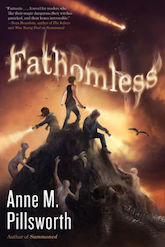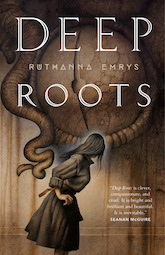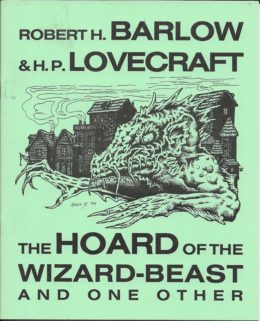Welcome back to the Lovecraft reread, in which two modern Mythos writers get girl cooties all over old Howard’s sandbox, from those who inspired him to those who were inspired in turn.
This week, we’re reading Lovecraft and R.H. Barlow’s “The Hoard of the Wizard-Beast,” written in 1933 and first published in Necronomicon Press’s The Hoard of the Wizard-Beast and One Other in 1994. Spoilers ahead.
“Unconcernedly munching something the priests had given It was a large pudgy creature very hard to describe, and covered with short grey fur. Whence It had come in so brief a time only the priests might tell, but the suppliant knew that It was Oorn.”
Summary
Though many-towered Zeth, um, towers over strange vegetation prowled by strange beasts, yet it is subject to the same administrative ills as earthly capitals. In this case, embezzlement. When the giphath Yalden opens the city’s treasury, he finds the vault empty but for the webs of sardonic spiders and a few phlegmatic rats. This is a grave matter, requiring grave action—he must at once consult the god-oracle Oorn!
Now Oorn may be the virtual ruler of Zeth, but this excessively bizarre create comes no doubt from the outer abyss. One night It blundered into the city, only to be captured by priests who appreciated the possibilities offered by Its parrot-like gift for mimicry. They set It up in a splendid hall, where It might utter such edicts as Its servant priests prompted.
Being no less credulous than his fellows, Yalden makes obeisance and pecuniary offering to the gray-furred, three-eyed Oorn on Its jeweled dais. He receives this direction: “Go thou unto thy destination.” The priests helpfully interpret this to mean Yalden should slay the monster-wizard Anathas and replenish Zeth’s treasury with its fabled hoard.
Anathas! Even those inhabitants of Ulathia who doubt its existence do not chose to live near the Cave of Three Winds, where this being is supposed to lurk. Some say it may be glimpsed from afar as a giant black shadow. Others allege it’s a gelatinous mound that oozes like putrescent flesh, still others a monstrous insect. All agree on one point: One should have nothing to do with Anathas.
However, Yalden is young. In addition to replenishing the treasury with Anathas’s hoard, he hopes to rescue some lissome young woman from the wizard-beast’s twisted erotic tastes. He consults with a reputable old wizard and acquires necessaries for his quest: A charm to prevent hunger and thirst, a cloak to shield him from dangerous mineral emanations, and safeguards against certain land-crustaceans and deadly-sweet mists. Thus fortified, he journeys without incident until he comes to the place of the White Worm.
Trapped within Yalden’s magical mark, the colorless maggot directs the seeker onward. Yalden passes through desert lands toward a hazy plateau. Elder monsters are fabled to dwell there, and pets of Anathas’s own making. Yet as Yalden at last approaches the boulder-obscured Cave, he finds its utter isolation and quiet most ominous. No living thing greets him, only the bones of all those heroes and thieves who sought Anathas’s hoard before Yalden, arranged in cryptic patterns.
Cryptic patterns, yes, but surely one need not possess the key to their exact meaning to get the gist of the message: Stay away or else, all ye wizard-slayer wannabes. Having come so far, Yalden may tremble as he clutches his priest-sanctified sword but he cannot hesitate—ascertaining (somehow) that Anathas is away, he plunges into the cave and squirms deep under the plateau until he comes to a vast cavern paved with burning coals, above which shriek wyvern-headed birds, upon which slither monstrous green salamanders. Fire is their natural element; there seems no way for a man to cross the cavern to the metal dais heaped with jewels and gold and all manner of precious objects, the hoard of the Wizard-Beast!
Desperation drives Yalden to step onto the fiery pavement. To his amazement, it changes to cool earth under his feet and unfurls into a narrow path straight to the treasure-heaped dais. In his joy and anticipation of returning home a treasure-laden hero, Yalden doesn’t wonder at the too-friendly behavior of the fiery pavement or the laxness of Anathas’s security. (Maybe this is one of those paths that opens only to the truly righteous?) He hurries along the cool path to the dais, not even noticing the huge arched opening behind it.
Once ankle-deep among the golden relics and luminous gems of the hoard, Yalden perceives his mistake. The cool path has vanished again under flame. A huge gelatinous shadow looms in the archway, more hideous than anything hinted at by legend. The shadow’s seven iridescent eyes regard him with placid amusement.
And then Anathas the wizard-beast rolls forth to jest with his small terrified conqueror before allowing the hungry green salamanders to complete their slow ascent of the dais.
What’s Cyclopean: Anathas is “mighty in necromantic horror” and decorates its lair with “ossuary ornamentation.” Get too close, and you too might become ornamental.
The Degenerate Dutch: Lovecraft takes a couple of pages to wax snarky about religion, government, and combinations thereof—and those who are credulous of them—before sending Yalden off on his quest.
Mythos Making: You have your choice of two indescribable elder creatures this week, one much cuter than the other.
Libronomicon: No books this week.
Madness Takes Its Toll: No madness this week, just an (understandably) anxious githath.
Buy the Book


Fathomless
Anne’s Commentary
Wizards are generally brilliant, temperamental, egotistical and easy to offend. Beasts are generally very large, very strong, very ugly and very hungry. Wizard-beasts do not even bear thinking about, unless you are Lovecraft and his Number One Fanboy, R. H. Barlow. Barlow was thirteen when he first wrote to Lovecraft, fifteen in 1933 when the two collaborated on “Hoard of the Wizard-Beast.” According to Paul La Farge, author of The Night Ocean, young Barlow couldn’t find many—or any—people with similar interests in the outskirts of Deland, Florida, where his father had settled the family. Then again, his interests were collecting weird fiction, playing piano, sculpting and painting, and shooting snakes for their skins. Now, having lived in northern Florida, I know Barlow could have found companions happy to go out shooting them some rattlers and cottonmouths and such. I’m pretty sure, however, they wouldn’t have been interested in using the skins to bind books.
That’s just a waste of good belt and boot leather, boy! No wonder you got no friends!
Lovecraft wouldn’t meet Barlow until 1934, when he traveled to Florida for a visit. As Barlow hadn’t mentioned his age in all their correspondence, the forty-three-year-old must have gotten quite a surprise when he climbed off the bus in Deland to be greeted by a skinny sixteen-year-old. His collaborator on “Wizard-Beast” could keep right up with Howard in the sardonic sophistication of its Dunsanian world-spinning and wit. There are some deliciously dry bits and savory turns of phrase in this story: “the sardonic spider [weaving] webs of mocking design” over empty coffers and “phlegmatic rats peering sharply” at Yalden as at “an alien intruder”; the theft of the treasure being “a very grave matter” needing “to be met in a very prompt and serious way,” so that “clearly, there was nothing to do but consult Oorn, and Oorn was a highly portentous being.” Then there is the sublime silliness of the dread incident of “the place of the White Worm.” The WHITE WORM, people! That’s got to be one hellacious creature, right? As it turns out, our hero must, “with patient diligence,” capture “the small colorless maggot” and ask it for directions. The capper is, as we’re told with great solemnity, that “the Lord of Worms” is named “Sarall.” Oooh, roll that one off the tongue, scary!
My favorite bit of all is the end, in which Anathas’s seven iridescent eyes regard its victim with “placid amusement.” “Placid” is so beautiful here, because so little expected of either a vengeful wizard or furious beast or indeed anything “mighty in necromantic horror.” The contrast is high humor, spiked by the dragging agony of suspense (for small, frightened Yalden and the sympathetic reader) of the salamanders’ climb.
Timely sidebar: The opening contention of this story is that what happened in Zeth was no different a catastrophe than has occurred occasionally in any governing town of our own world. Ain’t that the sad truth. Just a few days ago, September 15, we marked the tenth anniversary of the bankruptcy of Lehman Brothers, arguably the first mega-sinkhole in the 2008 financial crisis. Listen up, everyone, from you governments to you corporations to you small businesses to you private citizens! Don’t be stupid with your money! Take some lessons from many-towered Zeth!
To start, what’s with the many towers? I get this vibe from a lot of Dreamlandsy towns that most of the towers are just for show, so the town can call itself many-towered. Cut that crap out. Also the walls and streets made of unnecessary expensive materials. If you keep down infrastructure costs, towns (Zeth, looking at you), you might have other options in treasury crises than quixotic raids on wizard and/or beast hoards. Like, if you hadn’t so taxed the populace to death on jade and chalcedony for the walls and cobblestones, you could have eked out some more taxes to refill the public coffers.
What’s with this lax municipal accounting? Of course old Kishan got away with embezzling the treasury down to the last phrulder! Have you never heard of auditors? Did you never notice all those new chariots Kishan was driving through the streets of jade and chalcedony? Where the hell was Yalden while the spiders were spinning mocking webs?
A government commission also needs to address the Oorn situation. Shamith priests or no, those guys need to be held accountable for fraud like anyone else.
Taking crazy risks with your own money? Not advisable in most cases. Taking crazy risks with the public’s money, or with recouping it? Like spending what little may be left paying for Oorn oracles and wizard knick-knacks, so some total doofus of a giphath can go questing for wizard-beasts which may not even be real, but if they are, they’ll surely smash him like a flea? Don’t do it. Just don’t.
Finally, maybe take a lesson from Anathas. Why does it have a hoard? Just for the sake of hoarding? No! It uses its hoard for two purposes, both laudable. The first is practical: Hoards lure thieves and would-be heroes, the very best feed for green salamanders. The second is a matter of social ethics. Hoards also lure greedy functionaries (what do you think killed embezzler Kishan after the Zeth treasury had no more to offer?). And they are a fine way to winnow out clueless bureaucrats like Yalden, especially after Anathas started rumors about its taste for rescuable maidens.
I’ve also heard that Anathas has set up a foundation to fund other civic-minded beasts, dragons, ogres, etc., so they too can promote the economic good of humankind. I think Howard and Robert would be proud to hear their creation continues the good work they started it upon.
Buy the Book


Deep Roots
Ruthanna’s Commentary
In our last Lovecraft/Barlow piece, we found the pair pondering the existential horror of the ocean, and of human extinction. On this earlier expedition, they’re in a lighter mood, or at least a snarkier one. “Hoard of the Wizard-Beast” is not quite “Sweet Ermengarde,” but happily sets aside plot, or the actual details of the central quest, in favor of opportunities to poke holes in tropes that were overly troped even in 1933. In some ways it’s appropriate that it wasn’t published until 1994, in the age of the evil overlord list and Diana Wynne Jones’s The Tough Guide to Fantasyland.
We start with some sharp prods at civil government, organized religion, and civil religion. “Some jerk embezzled the city treasury” is not a frequent motivation for quests, although perhaps it should be. Then there’s the fraudulent oracle, fronted by a creature from the outer abyss. Yalden enters the temple “acceptably, in a humble manner which greatly [impedes] progress.” The oracle therein is pudgy, covered in soft gray fur, and munching on something that I strongly suspect of being a carrot. I’m sorry sir, but your indescribable eldritch horror is… adorable. What happens if you scritch Oorn behind the ears? Has Oorn got ears to scritch? Miskatonic University must set up a well-funded research program, or at least a dedicated Tumblr, to address these important questions as quickly as possible.
Redirecting myself from the distraction of Oorn’s fuzzy gray not-ears, we’re left to ponder why its priests decided on this particular solution to Zeth’s financial difficulties. Did they think it would work? Did they want Yalden out of the way? How do they plan to handle the empty treasury when he doesn’t come back. In any case, for whatever nefarious purpose, they send him off on a quest to the Cave of Three Winds (so called, one presumes, because it sounds poetic), from which no traveler has returned in spite of the considerable wealth stored therein.
And perhaps not only wealth. Yalden wants to get that hoard not only out of patriotic duty, but in the hope of rescuing some feminine victim of Anathas’s “famed and surprisingly erotic taste.” This in a story written by two authors who could win some sort of award for “Least Likely to Include Scantily Clad Women in Their Pulp Fiction.” As, indeed, they do not include such a thing in this story. I’m afraid that next to my mental image of Oorn’s eldritch adorability, I’m now picturing Anathas as Jabba the Hutt. No ear-scritching there. (While I’m at it, I’m also going to imagine the White Worm as the little caterpillar who helpfully directs Sarah away from the evil overlord near the start of Labyrinth.)
Whatever his motivation, Yalden falls prey to the traditional heroic flaw of hubris. Wizard-beast not obviously at home? Great, let’s go right in! Because a wizard’s home is so rarely a source of danger all on its own. This reminds me a bit of “In the Walls of Eryx.” There too, albeit with a less skilled young co-author, overconfidence is the death of someone who just wanted to explore an alien structure. Lovecraft may have admired “men of action,” but cosmic horror dictates that such action only rarely protects you from the vagaries of the universe. Sometimes the universe barely notices the futility of your actions. Other times, like this week, it jests with you briefly before you get eaten. (All but the bones, of course. Bones are decorative. Or at least, wanted elsewhere.)
Next week, the pernicious influence of mind-warping literature rears its head again in Nadia Bulkin’s “Pro Patria.” You can find it in the Cassilda’s Song anthology.
Ruthanna Emrys is the author of the Innsmouth Legacy series, including Winter Tide and Deep Roots. Her neo-Lovecraftian stories “The Litany of Earth” and “Those Who Watch” are available on Tor.com, along with the distinctly non-Lovecraftian “Seven Commentaries on an Imperfect Land” and “The Deepest Rift.” Ruthanna can frequently be found online on Twitter and Dreamwidth, and offline in a mysterious manor house with her large, chaotic household—mostly mammalian—outside Washington DC.
Anne M. Pillsworth’s short story “The Madonna of the Abattoir” appears on Tor.com. Her young adult Mythos novel, Summoned, is available from Tor Teen along with sequel Fathomless. She lives in Edgewood, a Victorian trolley car suburb of Providence, Rhode Island, uncomfortably near Joseph Curwen’s underground laboratory.










